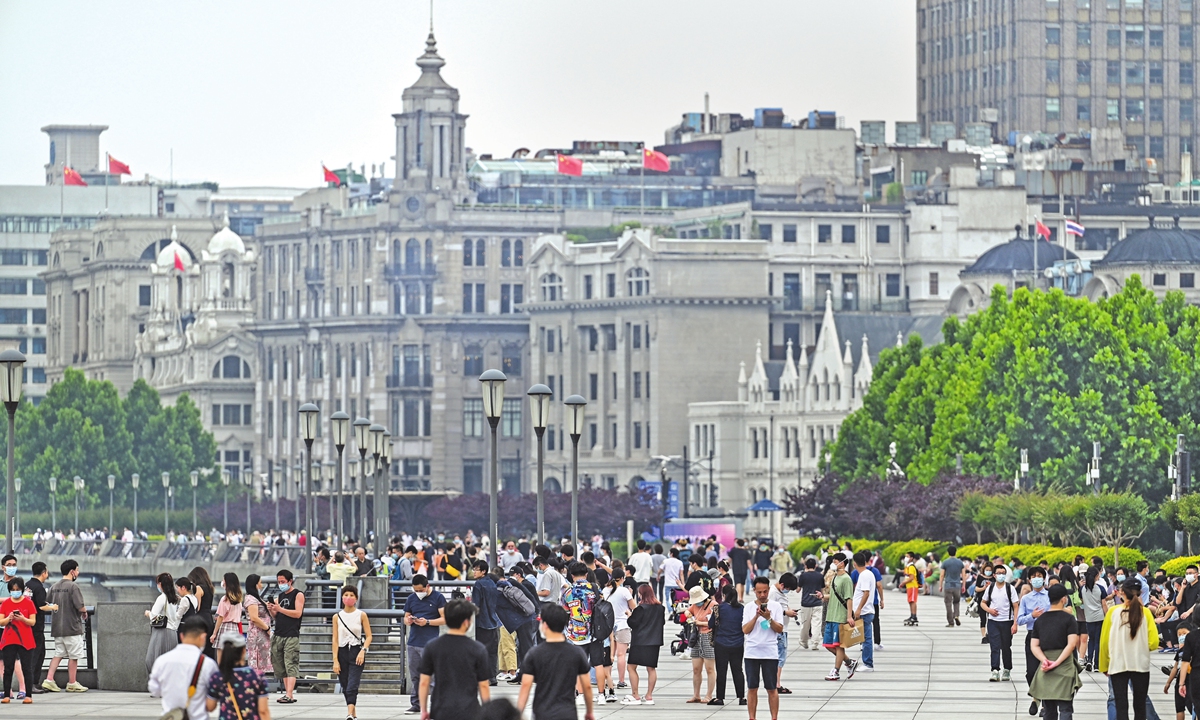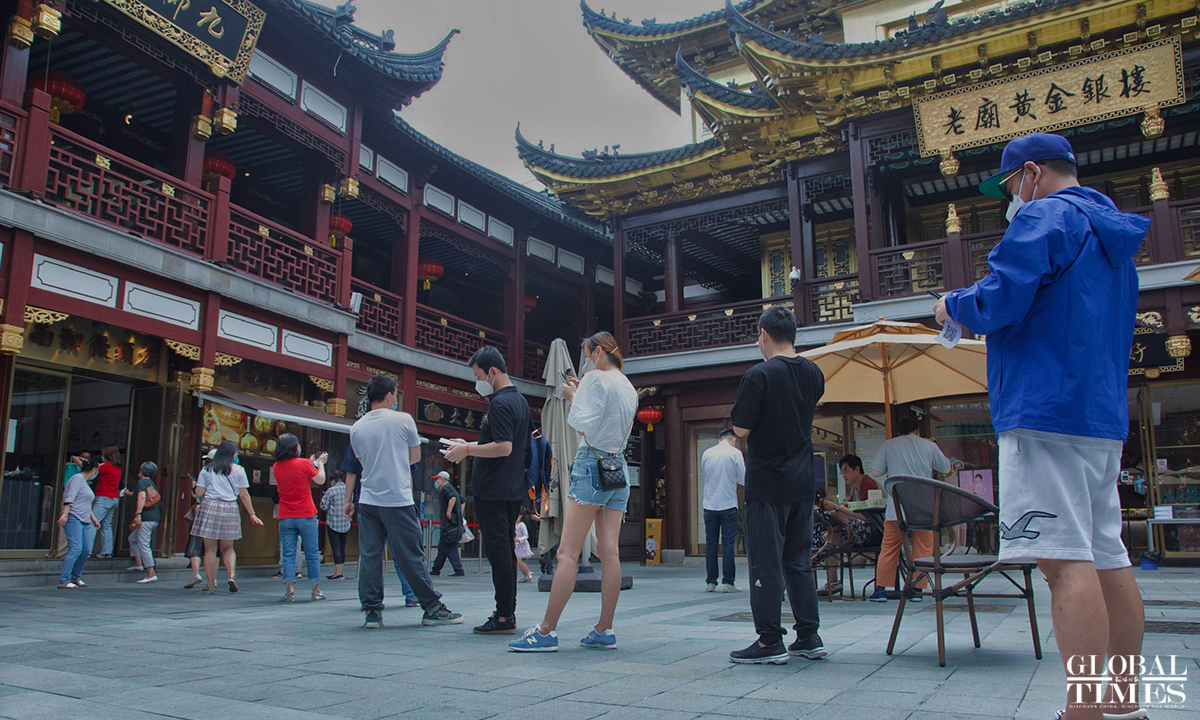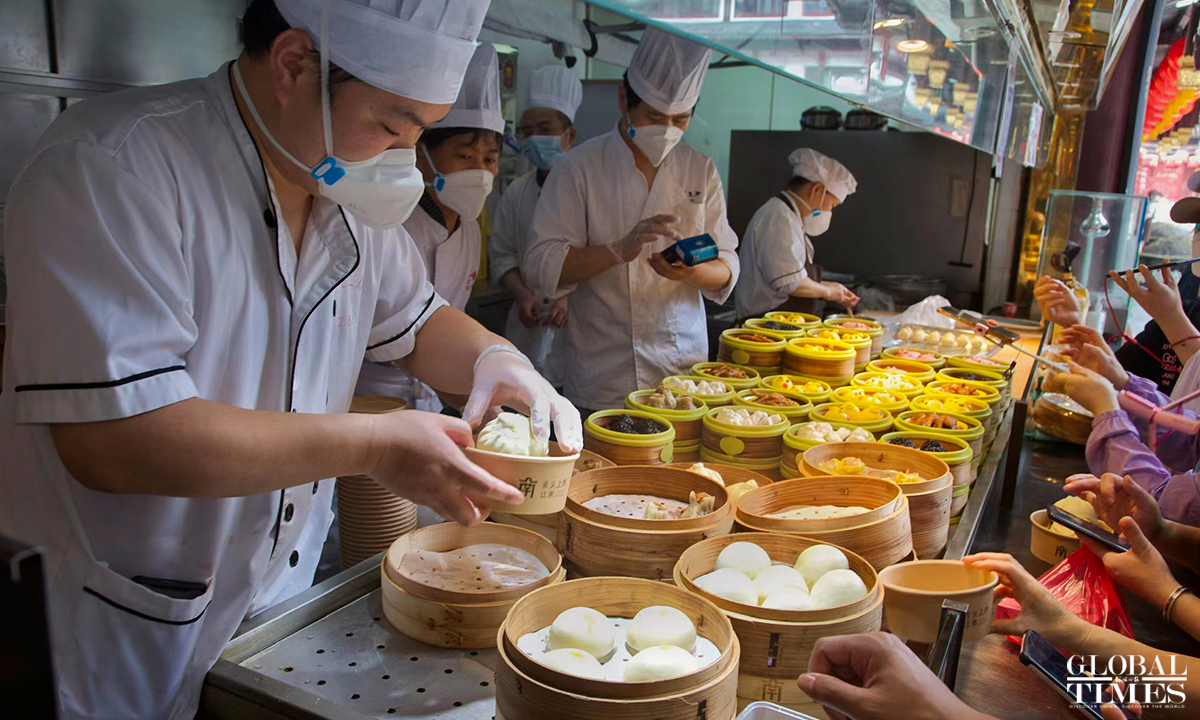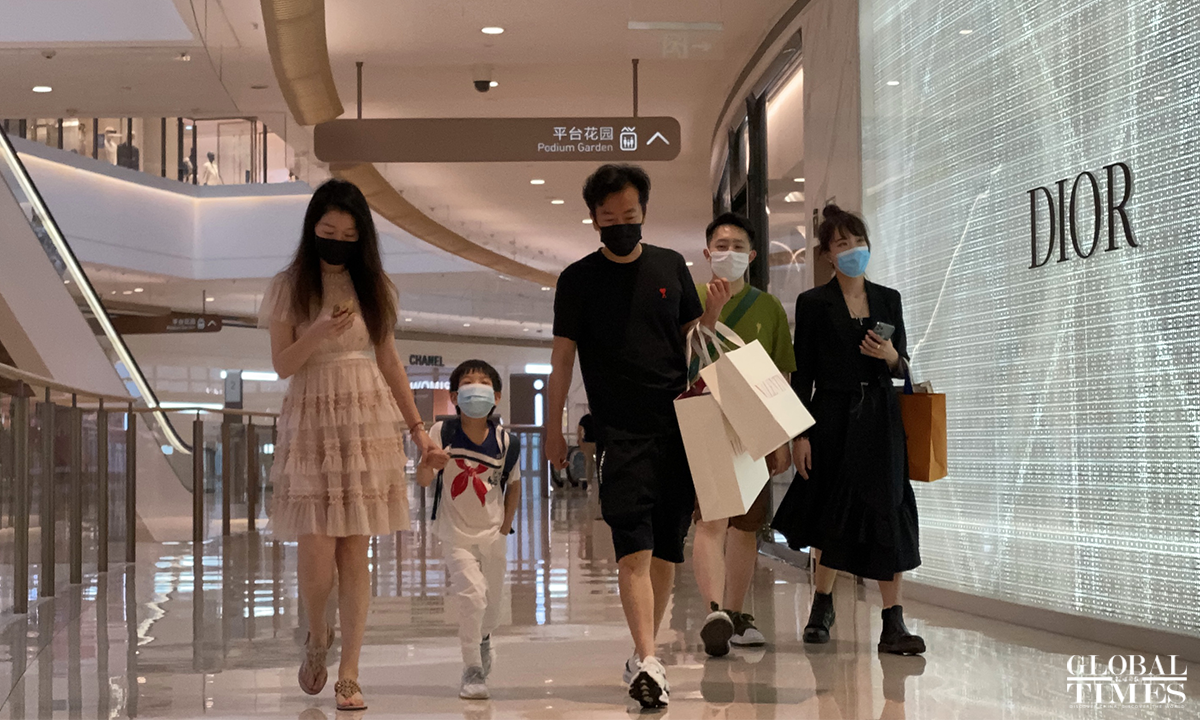Roaring back, Shanghai’s exuberance, potential on full display on first day of lockdown lift
www.globaltimes.cn
 People gather on the Bund along the Huangpu River in Shanghai on June 1, 2022, following the easing of COVID-19 restrictions in the city after a two-month lockdown. Photo: AFP
People gather on the Bund along the Huangpu River in Shanghai on June 1, 2022, following the easing of COVID-19 restrictions in the city after a two-month lockdown. Photo: AFP
 On the first day of Shanghai resuming normal life, one of the main attractions in the city, the Yuyuan Garden welcomes tourists on June 1. Visitors take photos and many time-honored brand restaurants welcome customers. At present, the scenic spot requires visitors to make an appointment and show their health code to enter. Photo: Wu Shiliu/GT
On the first day of Shanghai resuming normal life, one of the main attractions in the city, the Yuyuan Garden welcomes tourists on June 1. Visitors take photos and many time-honored brand restaurants welcome customers. At present, the scenic spot requires visitors to make an appointment and show their health code to enter. Photo: Wu Shiliu/GT
From commuters rushing back to the office right after anti-epidemic restrictions were lifted to the long queues in front of both street vendors and high-end luxury shops, Shanghai on Wednesday ended its two-month lockdown to embrace a brand new start in unique fashion befitting its special status as an economic powerhouse and pioneer in the country's reform and opening-up with dizzying speed and extraordinary efficiency.
The two-month dormancy of Shanghai, a city with 25 million population and as China's economic development engine, sparked wide concern that it severely battered Chinese economy. People wonder if it will still be "business as usual" even if Shanghai wakes up from the COVID-19 swoon. But it is believed that the unique vibrant spirit of the Pearl of the Orient, along with the city's century-long experience as a driver of national economy and special leading role in China's most active economic zone, will ensure the city bounces back strongly and quickly.
"It's almost a belated New Year celebration," a Shanghai resident surnamed Li posted on his WeChat, along with pictures of him watching fireworks from Shanghai's landmark tourist site the Bund.
After the Shanghai government eased COVID-19 restrictions for low-risk areas from Wednesday, most Shanghai people went outside to "get a sniff of fresh air." The city's barber shops were among the first to get their hands full. A barber in Huangpu district said he received 30 phone calls for appointments within half an hour on Wednesday.
There were long lines at most commercial areas, which resumed off-line services in recent days with a 75 percent cap on customer flow. The Global Times witnessed long lines at downtown luxury shopping mall Plaza 66. A woman was seen carrying three huge bags from French luxury brand Hermès, riding away with them hanging on her shared bike, as private vehicles are not allowed in that area.
Li Man, a Shanghai resident who walked out after 67 days, said she saw people of different colors and ages standing in front of cafés and bars, talking in different languages, and a group of middle-aged men talking about "supply chains," "financing" and "logistics." "I know the same old Shanghai is back."
Most of the city's gardens and entertainment venues are also open with a cap on numbers. However, Shanghai Disney Resort, one of the most visited tourist sites before lockdown, has not announced a reopening date.
Li Mohan, a Shanghai resident who arrived at the subway station at 7:30 am to go to work on Wednesday, found the station filled with commuters like himself. "Rushing back to work on first day after lockdown stopped? Maybe that's the Shanghai spirit."
 On the first day of Shanghai resuming normal life, one of the main attractions in the city, the Yuyuan Garden welcomes tourists on June 1. Visitors take photos and many time-honored brand restaurants welcome customers. At present, the scenic spot requires visitors to make an appointment and show their health code to enter. Photo: Wu Shiliu/GT
On the first day of Shanghai resuming normal life, one of the main attractions in the city, the Yuyuan Garden welcomes tourists on June 1. Visitors take photos and many time-honored brand restaurants welcome customers. At present, the scenic spot requires visitors to make an appointment and show their health code to enter. Photo: Wu Shiliu/GT
Rich experience as backbone
The Shanghai government issued a thank you letter to residents on Tuesday night, pledging to "spare no effort to promote the full restoration" of normal life and to "do our best to recover the time and losses caused by the epidemic."
The government on Sunday announced a 50-measure action plan, covering tax rebates, rent reductions, financial subsidies, job market stabilization, and stabilizing foreign-funded companies' development, which marks the city's latest efforts to help enterprises through the financial difficulties due to the lockdown.
Experts expressed firm confidence in Shanghai's ability and potential to drive its economy back onto the right track in the shortest time possible, citing the city's strong economic foundations and its special leading role in the Yangtze River Delta.
"I believe that Shanghai needs some time to recover, whether in terms of market order or companies' production resumption, but in the long run, confidence, whether from market, companies, residents or consumers will increase step by step as production and commercial activities go back to normal," said Wang Peng, an assistant professor at the Gaoling School of Artificial Intelligence at the Renmin University of China.
Wang's anticipations are based on several months' observations. First, he said that Shanghai has a strong foundation in terms of residents' income, company numbers, production capabilities, and the city's abilities to absorb resources in China's nationwide supply chains.
Shanghai residents' annual per capita disposable income stood at 78,027 yuan ($11,673) in 2021, the highest among all mainland cities, data published by the National Bureau of Statistics showed. By the end of 2021, Shanghai had more than 2 million companies each with a registered capital of more than 1 million yuan.
Also, Shanghai's government and companies have accumulated a lot of experience over the years in how to give full play to market forces, said economists.
"Besides, Shanghai plays a leading role in Yangtze River Delta integration. Therefore, cities in the region, as well as other cities will supply and transfer a lot of resources to Shanghai," Wang said.
 The Plaza 66 shopping mall on Nanjing road in Shanghai resumed business on June 1. The flow of people has increased and there are long queues in front of some luxury stores. Photo: Chen Xia/GT
The Plaza 66 shopping mall on Nanjing road in Shanghai resumed business on June 1. The flow of people has increased and there are long queues in front of some luxury stores. Photo: Chen Xia/GT
It's business as usual
As the lockdown was lifted, some foreign media again started a new torrent of downplaying the pace of the city's recovery, as they said that fear of a return to strict antivirus measures will keep businesses on tenterhooks.
Some residents expressed concerns over a resurgence of the outbreak as one German resident named Thomas said that he feels "weird as [the city] jumped from complete lockdown overnight back to normal." Yet epidemiologists like Chen Xi, an associate professor of public health at Yale University, said that after this hard-won phased victory, Shanghai will be more experienced in balancing handling the Omicron variant and economic development.
Meanwhile, Shanghai is not letting its guard down in face of the risk of a flare-up. Global Times reporters noticed that residents would consciously test their temperature, scan health code and disinfect hands with sanitizer before entering stores and shopping malls. Lines were also witnessed at the nucleic acid testing spots on the streets.
Zeng Guang, former chief epidemiologist of China's Centers for Disease Control and Prevention, told the Global Times that although there is no such thing as a return to normal overnight, Shanghai's experience has taught other cities how to strike a better balance between COVID-19 prevention and boosting the economy. "The principle," Zeng said, "is to maintain a low mortality rate, keep people's lives unaffected by the outbreaks, and protect GDP from suffering a huge blow."
The city's attraction for overseas investment was never stagnant, and most businesses are upbeat that the city's economic potential could easily leap back to normal now that lockdown has been mostly lifted.
One example of such companies is cosmetics giant L'Oréal, which set up a new investment firm in Shanghai in May.
Fabrice Megarbane, president of L'Oréal North Asia Zone and CEO of L'Oréal China, told the Global Times that signing of the company took place in a "symbolic period" where Shanghai was under lockdown because of COVID.
"So of course, I'm very confident on the long term of China. And of course, when I look at Shanghai, I can say that the moment there will be stores and the possibility of buying cosmetics customers will come back. And I'm very confident that consumers, actually, in Shanghai, will come back to consumption, particularly for our industry of beauty products," Megarbane said.
All eight supermarkets owned by German wholesaler Metro AG resumed operation on Wednesday. The company's spokesperson told the Global Times they have tripled or quintupled their orders of daily necessities compared with the pre-outbreak era. Cai Tianle, CEO of the company, said the Chinese consumer market remains one of the most appealing in the world, and Metro AG will set up new shops in cities such as Beijing, Shanghai and Wuhan.
Local companies are at full speed to push up production as the coronavirus ebbs away. China's top automaker SAIC Motor, which is headquartered in Shanghai, told the Global Times on Wednesday that the company has resumed 80 percent of its full production capacity.
"Just look at the hustle and bustle on the streets of Shanghai the first day after lockdown is lifted, as though life has been thrown back to pre-outbreak level… it's an unbelievable change," said Wang Fan, owner of a small business in Shanghai, noting that such exuberance, energy, that is unique to Shanghai, will help Shanghai on the fast track of recovery. "Shanghai is back. Our business is going on as usual."
www.globaltimes.cn


From commuters rushing back to the office right after anti-epidemic restrictions were lifted to the long queues in front of both street vendors and high-end luxury shops, Shanghai on Wednesday ended its two-month lockdown to embrace a brand new start in unique fashion befitting its special status as an economic powerhouse and pioneer in the country's reform and opening-up with dizzying speed and extraordinary efficiency.
The two-month dormancy of Shanghai, a city with 25 million population and as China's economic development engine, sparked wide concern that it severely battered Chinese economy. People wonder if it will still be "business as usual" even if Shanghai wakes up from the COVID-19 swoon. But it is believed that the unique vibrant spirit of the Pearl of the Orient, along with the city's century-long experience as a driver of national economy and special leading role in China's most active economic zone, will ensure the city bounces back strongly and quickly.
"It's almost a belated New Year celebration," a Shanghai resident surnamed Li posted on his WeChat, along with pictures of him watching fireworks from Shanghai's landmark tourist site the Bund.
After the Shanghai government eased COVID-19 restrictions for low-risk areas from Wednesday, most Shanghai people went outside to "get a sniff of fresh air." The city's barber shops were among the first to get their hands full. A barber in Huangpu district said he received 30 phone calls for appointments within half an hour on Wednesday.
There were long lines at most commercial areas, which resumed off-line services in recent days with a 75 percent cap on customer flow. The Global Times witnessed long lines at downtown luxury shopping mall Plaza 66. A woman was seen carrying three huge bags from French luxury brand Hermès, riding away with them hanging on her shared bike, as private vehicles are not allowed in that area.
Li Man, a Shanghai resident who walked out after 67 days, said she saw people of different colors and ages standing in front of cafés and bars, talking in different languages, and a group of middle-aged men talking about "supply chains," "financing" and "logistics." "I know the same old Shanghai is back."
Most of the city's gardens and entertainment venues are also open with a cap on numbers. However, Shanghai Disney Resort, one of the most visited tourist sites before lockdown, has not announced a reopening date.
Li Mohan, a Shanghai resident who arrived at the subway station at 7:30 am to go to work on Wednesday, found the station filled with commuters like himself. "Rushing back to work on first day after lockdown stopped? Maybe that's the Shanghai spirit."

Rich experience as backbone
The Shanghai government issued a thank you letter to residents on Tuesday night, pledging to "spare no effort to promote the full restoration" of normal life and to "do our best to recover the time and losses caused by the epidemic."
The government on Sunday announced a 50-measure action plan, covering tax rebates, rent reductions, financial subsidies, job market stabilization, and stabilizing foreign-funded companies' development, which marks the city's latest efforts to help enterprises through the financial difficulties due to the lockdown.
Experts expressed firm confidence in Shanghai's ability and potential to drive its economy back onto the right track in the shortest time possible, citing the city's strong economic foundations and its special leading role in the Yangtze River Delta.
"I believe that Shanghai needs some time to recover, whether in terms of market order or companies' production resumption, but in the long run, confidence, whether from market, companies, residents or consumers will increase step by step as production and commercial activities go back to normal," said Wang Peng, an assistant professor at the Gaoling School of Artificial Intelligence at the Renmin University of China.
Wang's anticipations are based on several months' observations. First, he said that Shanghai has a strong foundation in terms of residents' income, company numbers, production capabilities, and the city's abilities to absorb resources in China's nationwide supply chains.
Shanghai residents' annual per capita disposable income stood at 78,027 yuan ($11,673) in 2021, the highest among all mainland cities, data published by the National Bureau of Statistics showed. By the end of 2021, Shanghai had more than 2 million companies each with a registered capital of more than 1 million yuan.
Also, Shanghai's government and companies have accumulated a lot of experience over the years in how to give full play to market forces, said economists.
"Besides, Shanghai plays a leading role in Yangtze River Delta integration. Therefore, cities in the region, as well as other cities will supply and transfer a lot of resources to Shanghai," Wang said.

It's business as usual
As the lockdown was lifted, some foreign media again started a new torrent of downplaying the pace of the city's recovery, as they said that fear of a return to strict antivirus measures will keep businesses on tenterhooks.
Some residents expressed concerns over a resurgence of the outbreak as one German resident named Thomas said that he feels "weird as [the city] jumped from complete lockdown overnight back to normal." Yet epidemiologists like Chen Xi, an associate professor of public health at Yale University, said that after this hard-won phased victory, Shanghai will be more experienced in balancing handling the Omicron variant and economic development.
Meanwhile, Shanghai is not letting its guard down in face of the risk of a flare-up. Global Times reporters noticed that residents would consciously test their temperature, scan health code and disinfect hands with sanitizer before entering stores and shopping malls. Lines were also witnessed at the nucleic acid testing spots on the streets.
Zeng Guang, former chief epidemiologist of China's Centers for Disease Control and Prevention, told the Global Times that although there is no such thing as a return to normal overnight, Shanghai's experience has taught other cities how to strike a better balance between COVID-19 prevention and boosting the economy. "The principle," Zeng said, "is to maintain a low mortality rate, keep people's lives unaffected by the outbreaks, and protect GDP from suffering a huge blow."
The city's attraction for overseas investment was never stagnant, and most businesses are upbeat that the city's economic potential could easily leap back to normal now that lockdown has been mostly lifted.
One example of such companies is cosmetics giant L'Oréal, which set up a new investment firm in Shanghai in May.
Fabrice Megarbane, president of L'Oréal North Asia Zone and CEO of L'Oréal China, told the Global Times that signing of the company took place in a "symbolic period" where Shanghai was under lockdown because of COVID.
"So of course, I'm very confident on the long term of China. And of course, when I look at Shanghai, I can say that the moment there will be stores and the possibility of buying cosmetics customers will come back. And I'm very confident that consumers, actually, in Shanghai, will come back to consumption, particularly for our industry of beauty products," Megarbane said.
All eight supermarkets owned by German wholesaler Metro AG resumed operation on Wednesday. The company's spokesperson told the Global Times they have tripled or quintupled their orders of daily necessities compared with the pre-outbreak era. Cai Tianle, CEO of the company, said the Chinese consumer market remains one of the most appealing in the world, and Metro AG will set up new shops in cities such as Beijing, Shanghai and Wuhan.
Local companies are at full speed to push up production as the coronavirus ebbs away. China's top automaker SAIC Motor, which is headquartered in Shanghai, told the Global Times on Wednesday that the company has resumed 80 percent of its full production capacity.
"Just look at the hustle and bustle on the streets of Shanghai the first day after lockdown is lifted, as though life has been thrown back to pre-outbreak level… it's an unbelievable change," said Wang Fan, owner of a small business in Shanghai, noting that such exuberance, energy, that is unique to Shanghai, will help Shanghai on the fast track of recovery. "Shanghai is back. Our business is going on as usual."

